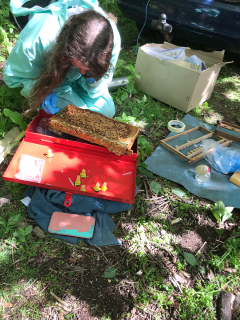Pupils use big data to monitor bee health
Beekeeping pupils learn to use large amounts of data and scientific methods to diagnose disease in their bees.

Beekeeping pupils and teachers are working with scientists from the Roslin Institute to explore how to use data to predict the health of their colony.
A smart monitoring system was set up by the pupils at Kelso High School to collect data from their schools’ honeybee apiaries every 5 minutes, every day, for several weeks.
Live data from the hive provides real-time information on aspects such as temperature, humidity, and sound frequency in the colony.
The pupils also analysed bees to test if they were affected by a common parasite, called Nosema, by using DNA and microscope analysis, with support from Roslin scientists and the Public Engagement team.
Their experiments enabled the pupils to better understand honeybee health and the role of science in beekeeping, so that they can better manage their hives.
This project has been funded by the Royal Society Schools Partnership Grant scheme. Science and Advice for Scottish Agriculture (SASA) are partners in the project.
It was great to meet school pupils again after such a long time without in-person workshops during the Covid pandemic. Using big data in this project furthers how we can support young Scottish beekeepers in using science to monitor the health of their bees.
Our students have been very impressive in so many ways. The current cohort joined our school bee club before the Covid pandemic, many became beekeepers in their own right during lockdowns and the experience became a positive one for the whole family. These 13 year old pupils are trying to produce three sister queens for their Royal Society research. As their teacher, this experience has been so rewarding, demonstrating the enormous talent that resides in young people. Also and very importantly is the huge value of working alongside STEM partners in extended research projects. Listening to these S3 students talk so fluently about many scientific topics related to honey bee health speaks volumes.
** The Roslin Institute receives strategic investment funding from the Biotechnology and Biological Sciences Research Council and it is part of the University of Edinburgh’s Royal (Dick) School of Veterinary Studies. **
Related links
EBSOC Bee Lab: Diagnosing the health of your honeybees


